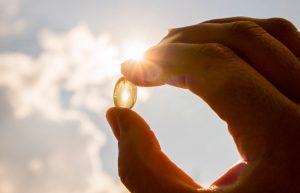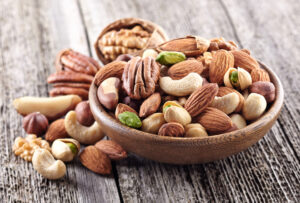January 10, 2024
Have you noticed thinning hair or hair loss? It can be distressing and may mean your body lacks essential nutrients. Genetics, aging, and a lack of vitamins can cause hair loss. To address hair loss, it’s important to know how specific vitamin deficiencies affect hair health. If you don’t get enough of these important nutrients, your hair growth can be affected. This may cause your hair to become thinner, brittle, and fall out more.
But there is good news. Hair loss from not enough vitamins can often be fixed.
This article will discuss seven vitamin deficiencies that lead to hair loss. These vitamins are vital for hair and overall health. We will also explore other symptoms and how to treat these deficiencies.
 1. Vitamin D
1. Vitamin D
Despite its name, vitamin D is not a vitamin but a hormone. Vitamin D is important for keeping skin and bones healthy and helps make new hair follicles. If deficient in this fat-soluble vitamin, you may have increased hair loss. This is mainly because it affects keratinocyte cells responsible for hair formation. Beyond promoting healthy skin and hair, Vitamin D is essential for calcium absorption and maintaining appropriate calcium and phosphorus levels needed for bone mineralization.
Additionally, vitamin D supports a healthy immune system. Long-term lack of vitamin D can lead to autoimmune conditions like diabetes, asthma, and rheumatoid arthritis.
Symptoms of vitamin D deficiency:
Some people with low vitamin D levels won’t have symptoms, making it hard to diagnose.
If you do experience symptoms, you may notice some of the following:
- Hair loss
- Brittle bones
- Fatigue
- Bone pain or joint stiffness
- Myalgias and muscle weakness
- Infants can experience bone malformation – a condition known as rickets.
How to get more vitamin D
Vitamin D can be taken as a supplement with the daily recommendation not to exceed 4000 IU. You should always consult your healthcare provider before starting a daily regimen. To further increase vitamin D intake- here are three ways:
- Include Vitamin D-rich foods, such as fatty fish, avocado, nuts, or fortified breakfast foods like milk, cereal, and orange juice.
- Moderate sunlight exposure each day
- Take a daily vitamin D3 supplement or cod liver oil.
2. Biotin
Biotin is often used to improve hair and nail strength, but it has other benefits. As part of the B vitamin family, biotin helps the body metabolize and break down carbohydrates, fats, and proteins into the energy you need. Biotin also helps keep blood sugar levels balanced between meals by aiding the liver in releasing glucose. When your body is deficient in biotin, your hair may become weak, and hair loss can be a result. Studies indicate that individuals who lack biotin can enhance their hair by taking supplements or increasing biotin in their diet.
Symptoms of biotin deficiency
Though biotin deficiency is rare, it can occur, particularly in people with conditions that impair nutrient absorption, such as Crohn’s disease. Symptoms of biotin deficiency may include:
- Hair thinning and shedding
- Dry or scaly skin
- Cracking in the corner of the mouth
- Dry eyes
- Swollen tongue
- Depression or fatigue
- Loss of appetite
- Insomnia
 Boosting your biotin intake
Boosting your biotin intake
You can find biotin in multivitamins or B-complex supplements or as a standalone supplement.
There are also several food options available to boost your biotin levels naturally. A few options include:
- Organ meats- such as liver
- Fish
- Nuts and seeds
- Broccoli, sweet potatoes and spinach
3. Iron
Low iron levels have been linked to a condition known as telogen effluvium. This condition leads to increased hair shedding and stagnant hair growth.
Symptoms of Iron deficiency
At first, you may notice more hair falling out. Over time, your hair will become thinner if you lack iron. Other common symptoms include:
- Dizziness
- Weakness
- Fast heart rate
- Feeling cold
- Headaches
- Exhaustion
- Pale skin
When you don’t have enough iron, it can cause iron deficiency anemia. This condition leads to low levels of red blood cells, which cause these symptoms. Low levels mean there aren’t enough red blood cells to transport oxygen throughout the body.
 Ensuring adequate iron intake
Ensuring adequate iron intake
If you have anemia from low iron, taking iron supplements can help with hair loss and other symptoms. But if your iron levels are normal, you shouldn’t take iron supplements because they can cause toxicity. If you are losing hair and your iron levels are normal, it’s important to consult a healthcare provider. At Healthcare Associates of Texas, we’re equipped to assist you in managing your hair loss concerns.
To increase your iron levels, eat iron-rich foods and take supplements. Here are some dietary items to consider:
- Seafood and fish
- Lean red meat
- Tofu
- Eggs
- Iron-enriched cereal and grains
- Dark, leafy green vegetables
If you have low iron levels, you can expect reduced hair shedding and healthier hair once iron levels are restored.
4. Folic acid (folate)
Folic acid, also called vitamin B9 or folate, is an important nutrient that helps cells grow. This essential vitamin helps grow hair, skin, and nails by supporting cell development. Folate is needed for making healthy red blood cells. It is crucial during pregnancy and fetal development. When this vitamin is deficient, cell growth slows down, leading to noticeable hair loss and a reduction in the natural growth of new hair.
Identifying a folic acid deficiency
You may experience these symptoms when deficient in folic acid:
- Fatigue
- Feeling short of breath
- Headaches
- Loss of appetite
- Ringing in the ears
- Heart racing
- Hair loss
Treatment for folic acid deficiency
If you have a medical condition like anemia or alcohol disorder, you may need treatment to manage folic acid levels. However, most folic acid deficiencies can be treated with supplements or prevented by eating a balanced diet. Consider Including these foods in your diet:
- Leafy green vegetables
- Enriched cereals and breads
- Nuts and fruits
- Lean meat
- Beans and legumes
5. Vitamin E
Vitamin E helps keep your scalp and hair healthy because it has antioxidants. This reliable source can be instrumental in supporting hair growth. Vitamin E antioxidants help protect the scalp by reducing oxidative stress and free radicals. These harmful substances can damage the cells in hair follicles. You might notice more hair loss, thinning, and dry, split ends if you lack this vitamin.
Signs of Vitamin E deficiency
- Impaired reflexes
- Weak muscles
- Premature infants may develop life-threatening anemia
- Impaired coordination
- Hair loss
- Brittle or dry hair
- Peripheral neuropathy
 Sources of vitamin E
Sources of vitamin E
Vitamin E can be taken as a supplement or is found in plant-based oils, seeds, fruits, and vegetables. You may want to include these options in your diet for more vitamin E:
- Wheat germ oil
- Red bell pepper
- Pumpkin
- Almonds or peanuts
- Sunflower, safflower or soybean oil
- Collard greens or spinach
- Avocados
6. Zinc
Zinc is an essential mineral for good health and well-being. It helps make hormones and enzymes, and it’s involved in over 100 chemical reactions in the body. It is very important in wound healing and immune system maintenance. It is also involved in cell division, cell development, and glucose breakdown.
Many foods contain zinc, but the body cannot store it, so we need to eat it daily. Factors like malabsorption, illness, stress, and allergies can deplete zinc levels. Not enough zinc can cause hair to shed and break easily. It can also affect growth and weaken the immune system.
Could you be deficient in zinc?
Here are a few symptoms you may notice if your body needs more zinc.
- Hair loss
- Skin changes
- Vision problems
- Increase in infections or illness
- Loss of taste and smell
- Delayed wound healing
Sources of zinc
Getting zinc from food is the best option. But taking supplements, with guidance from healthcare providers, can also help hair regrow. Some foods rich in zinc include:
- Beef or beef liver
- Lamb
- Oysters
- Kidney
- Milk
- Cheese
- Crab
7. Vitamin C
Not having enough vitamin C can make your hair dry and brittle. Vitamin C helps your body absorb iron, which is essential for growing healthy hair. The following factors can cause a lack of Vitamin C:
- Smoking
- Eating disorders
- Alcohol abuse
- Chronic illness
You may notice these symptoms if you need more vitamin C:
- Fatigue
- Depression
- Dry or brittle hair
- Gingivitis
- Delayed wound healing
 Sources of Vitamin C
Sources of Vitamin C
Taking vitamin C supplements daily can correct a deficiency. Cooking or storage can easily cause the loss of vitamin C because it is water-soluble. It is best to eat fresh fruits and vegetables, including:
- Oranges
- Lemons
- Strawberries
- Kiwi
- Melons
- Kale
- Broccoli
- Brussel sprouts
- Sweet potatoes
Addressing Hair Loss with Healthcare Associates of Texas
At Healthcare Associates of Texas, we identify and treat different health problems. This includes conditions that result in hair loss. We understand that losing hair can be upsetting, so we provide thorough care to treat the root causes. Whether it’s genetics, aging, or vitamin deficiencies, our team is equipped to help.
If you think a lack of vitamins is causing your hair loss, our healthcare providers can help you. We will help you identify the root cause of your hair loss and develop a personalized treatment plan. This may include dietary changes, supplements, or other medical interventions as needed.
Remember, many cases of hair loss related to vitamin deficiencies can be effectively addressed. With the right approach, it’s possible to restore the health and vitality of your hair. Don’t let hair loss affect your confidence and quality of life. Contact Healthcare Associates of Texas for expert help and support on your path to healthier hair.
References
- Sassi, F., Tamone, C. & Amelio, P. (2018). Vitamin D: Nutrient, Hormone, and Immunomodulator. Nutrients, 10 (11). Retrieved from https://www.ncbi.nlm.nih.gov/pmc/articles/PMC6266123/
- Saini, K. & Mysore, V. (2021). Role of Vitamin D in Hair Loss: A Short Review. Journal of Cosmetic Dermatology, 20 (11). Retrieved from https://pubmed.ncbi.nlm.nih.gov/34553483/
- Shaker, J. & Deftos, L. (2023). Calcium and Phosphate Homeostasis. Retrieved from https://www.ncbi.nlm.nih.gov/books/NBK279023/
- Sizar, O., Khare, S., Goyal, A. & Givler, A.(2023). Vitamin D Deficiency. StatPearls. Retrieved from https://www.ncbi.nlm.nih.gov/books/NBK532266/
- Office of Dietary Supplements – National Institutes of Health. (n.d.). Biotin: Fact Sheet for Consumers. Retrieved from https://ods.od.nih.gov/factsheets/Biotin-Consumer/
- Patel, D. P., Swink, S. M., & Castelo-Soccio, L. (2017). A Review of the Use of Biotin for Hair Loss. Skin Appendage Disorders, 3(3), 166–169. Retrieved from https://doi.org/10.1159/000462981
- Moeinvaziri, M., Mansoori, P., Holakooee, K., Naraghi, Z., Abbasi, A. (2009). Iron Status in Diffuse Telogen Hair Loss Among Women. Acta Dermatovenerologica Croatica, 4(279-84). Retrieved from https://pubmed.ncbi.nlm.nih.gov/20021982/
- Mayo Clinic. (n.d.). Iron deficiency anemia: Symptoms & causes. Retrieved from https://www.mayoclinic.org/diseases-conditions/iron-deficiency-anemia/symptoms-causes/syc-20355034
- Yousefi, M., Namazi, M., Rahimi, H., Younespour, S., Ehsani, A., Shakoei, S. (2014). Evaluation of Serum Homocysteine, High-Sensitivity CRP, and RBC Folate in Patients with Alopecia Areata. Indian Journal of Dermatology, 59 (6).Retrieved from https://pubmed.ncbi.nlm.nih.gov/25484412/
- Office of Dietary Supplements – National Institutes of Health. (n.d.). Vitamin E: Fact Sheet for Health Professionals. Retrieved from https://ods.od.nih.gov/factsheets/VitaminE-HealthProfessional/
- Maxfield, L., Shukla, S., Crane, J. (2023). Zinc Deficiency. StatPearls. StatPearls Publishing. Retrieved from https://www.ncbi.nlm.nih.gov/books/NBK493231/
Merck Manual Professional Version. (n.d.). Vitamin C Deficiency. Retrieved from https://www.merckmanuals.com/professional/nutritional-disorders/vitamin-deficiency,-dependency,-and-toxicity/vitamin-c-deficiency
DISCLAIMER
The information featured in this site is general in nature. The site provides health information designed to complement your personal health management. It does not provide medical advice or health services and is not meant to replace professional advice or imply coverage of specific clinical services or products. The inclusion of links to other web sites does not imply any endorsement of the material on such websites.